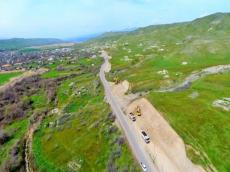|
|
TODAY.AZ / Business
Road infrastructure restoration underway in liberated lands
09 April 2021 [14:33] - TODAY.AZ

By Azernews
By Ayya Lmahamad
Large-scale construction work to restore the road infrastructure on Azerbaijan’s liberated territories is underway, the Azerbaijani State Agency of Automobile Roads has reported.
The Khudaferin-Gubadly-Lachin and Khanlig-Gubadly highways are among the road infrastructure projects being implemented.
The Khudaferin-Gubadly-Lachin road, which starts from the Hajigabul-Minjivan-Zangazur corridor section of the Khudaferin reservoir, will be 66 km long. It is also planned to build a new highway with a length of 17 km from Khanlig settlement to Gubadli town.
Under the presidential order, both roads will be built in view of Karabakh's development plan.
The highways will have four lanes and correspond to the first technical category.
The construction has already begun on the Khudaferin-Gubadly-Lachin highway section beginning from the Khudaferin reservoir and ending with the Khanlig settlement. The construction is carried out jointly with the Turkiyenin Polat Yol Yapi San.ve Tic. Company.
Moreover, a camp was built near Khanlig settlement to speed up the construction on the territory where an asphalt concrete plant, an office for workers, a special area for vehicles, mechanisms and their maintenance, a canteen and recreation areas will be located.
The new highways will pass through Azerbaijan’s liberated Zangilan, Gubadli and Lachin regions, and cover more than 30 settlements.
This highway project is part of the unified transport concept of the Nagorno-Karabakh region.
Currently, the work is underway to restore Azerbaijan’s liberated territories. Azerbaijan will carry out the restoration and reconstruction work on its recently-liberated territories in four stages. The initial stage includes the solution of the issues of governance and security, infrastructure, while the subsequent stages include the solution of the issues of social services activities, reconstruction and development of the economy.
Azerbaijan allocated AZN 2.2 billion ($1.3bn) for reconstruction works on the liberated territories in 2021. In particular, these funds will be used to restore the infrastructure (electricity, gas, water, communications, roads, education, health, etc), as well as cultural and historical monuments.
URL: http://www.today.az/news/business/204888.html
 Print version
Print version
Connect with us. Get latest news and updates.
See Also
- 03 December 2024 [12:48]
Azerbaijan-Russia Business Council elects new leadership in Baku meeting - 03 December 2024 [11:46]
Joint fintech initiatives to boost Azerbaijan-Türkiye financial ecosystem, says Deputy Chairman - 03 December 2024 [10:21]
Reconstruction of Agdam-Asgaran-Khojaly-Khankendi road is being rapidly continued - 02 December 2024 [17:08]
Azerbaijani delegation participates in 10th World Halal Summit in Istanbul - 02 December 2024 [14:45]
Ethiopian delegation gets acquainted with EZDA's activities - 02 December 2024 [13:05]
Milli Majlis hosts public hearing on return to Western Azerbaijan - 29 November 2024 [18:26]
CIS countries confirm priorities for industrial collaboration and labor market development - 29 November 2024 [17:32]
Discussion held on future cooperation with employers in providing employment in liberated areas - 29 November 2024 [13:23]
AZPROMO explores cooperation opportunities with Kars Chamber of Commerce and Industry - 29 November 2024 [11:28]
Coordinating Council established for electricity market holds meeting
Most Popular
 Secretary Blinken and Turkish FM Fidan discuss situation in Ukraine and S Caucasus
Secretary Blinken and Turkish FM Fidan discuss situation in Ukraine and S Caucasus
 "Armenian heritage" exists as long as it's funded – how CHW deceives the world.
"Armenian heritage" exists as long as it's funded – how CHW deceives the world.
 How the West betrayes and continues to betray Georgia and Ukraine
How the West betrayes and continues to betray Georgia and Ukraine
 Azerbaijan Defence Ministry presents weekly review
Azerbaijan Defence Ministry presents weekly review
 Armenian whining and the Azerbaijani magic wand
Armenian whining and the Azerbaijani magic wand
 Milli Majlis hosts public hearing on return to Western Azerbaijan
Milli Majlis hosts public hearing on return to Western Azerbaijan
 Senegal demands truth for French colonial-era atrocities in West Africa
Senegal demands truth for French colonial-era atrocities in West Africa
